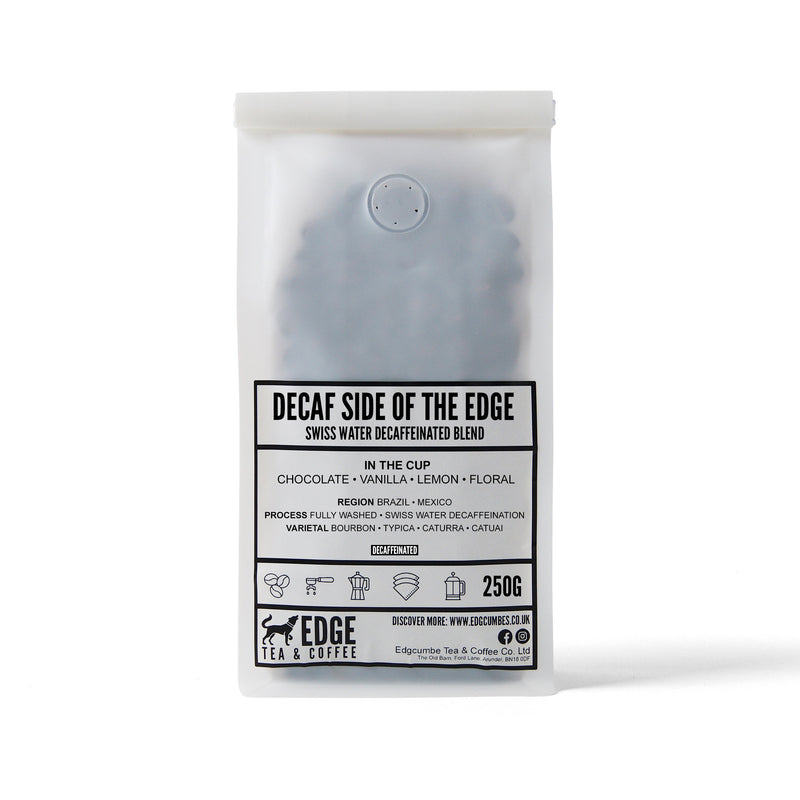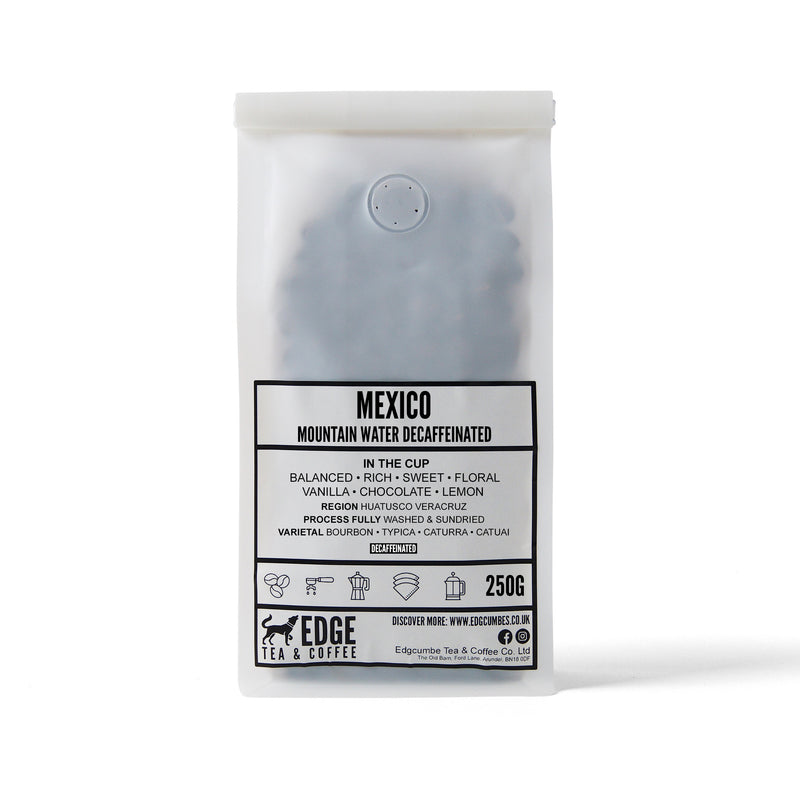How Much Caffeine is in Decaf Coffee?
Decaf coffee still contains caffeine, despite what many might think. While decaf has significantly lower levels of caffeine than regular coffee, the exact amount depends on how it’s made, brewed, and labelled.
Some cups contain just a few milligrams, while others carry more, enough to make a difference if you’re watching your intake.
Our coffee experts have put together this guide, packed with clear comparisons and breakdowns of the main factors that influence caffeine levels, from brewing style to bean type.
By the end, you’ll be able to choose your next decaf coffee with a bit more clarity.
How Much Caffeine Does Decaf Coffee Actually Contain?
Most decaf coffee contains between 2 and 7 milligrams of caffeine per cup. The exact amount can vary depending on how it’s brewed and what type of coffee is used. That’s a small fraction compared to regular coffee, which typically contains between 70 and 140 milligrams per 240ml cup.
Put simply, decaf isn’t caffeine-free, but it’s significantly lower in caffeine. To visualise the difference, a cup of decaf usually has less caffeine than a square of dark chocolate or half a can of Coca-Cola.
According to EU regulations, coffee can be labelled as “decaffeinated” if it contains no more than 0.1% caffeine in roasted beans and 0.3% in soluble coffee.
The actual amount in your cup depends on several factors, including brew method, bean type, and decaffeination process, all of which we’ll cover below!

Caffeine in Decaf by Brew Method
The brew method plays a big role in how much caffeine ends up in your cup, even when using decaf beans. Some methods extract more caffeine than others, even when using the same decaf grounds. Cold brew, for example, often contains more caffeine than you might expect.
|
Brew Type |
Typical Volume |
Caffeine Range (mg) |
Notes |
|
Espresso (single shot) |
30ml |
2–5mg |
Small but concentrated; double shots contain more |
|
Drip / Filter Coffee |
240ml |
2–7mg |
Standard serving size for most brewed coffee |
|
Pour-Over |
240ml |
2–6mg |
Similar to drip, but varies with pour rate and grind size |
|
French Press |
240ml |
3–8mg |
Immersion method tends to extract slightly more |
|
Cold Brew |
240ml |
4–12mg |
Long steeping time increases caffeine, even in decaf |
|
Instant Coffee |
240ml |
1–5mg |
Typically lower, but varies by brand and blend |
Here’s how the brewing method can affect decaf caffeine content:
-
Espresso: Small in volume, but concentrated. A single shot contains around 2–5mg of caffeine. Double shots will double that figure.
-
Drip and pour-over: These common methods produce a balanced extraction. Most cups fall between 2 and 7mg of caffeine.
-
French press: As an immersion method, it typically extracts slightly more caffeine than drip or pour-over, often reaching 8mg per cup.
-
Cold brew: Despite using decaf grounds, the long steeping time (often 12+ hours) draws out more caffeine. Cold brew decaf can reach 10–12mg per serving.
-
Instant coffee: Usually contains the least caffeine, but blends vary. Some decaf instant coffees still contain up to 5mg per cup.
Strength also depends on how much ground coffee is used. A stronger brew, larger serving, or multiple espresso shots will raise the caffeine total, even with decaf beans. If you’re aiming to limit intake as much as possible, cold brew and double espressos are worth moderating.
Need the right kit to make the most of your decaf? Browse our coffee brewing equipment now, from cafetières to pour-over sets.

Is Decaf Coffee Completely Caffeine-Free?
No. Decaf coffee still contains caffeine, just in very small amounts. It’s not enough to affect most people, but it isn’t technically caffeine-free.
UK law requires that coffee can only be labelled as “decaffeinated” if it contains no more than 0.10% residual caffeine for roasted beans, or 0.30% for instant coffee, based on its dry matter. These thresholds are nearly identical to the long-standing EU regulations still widely used across the industry.
Meanwhile, the Food Standards Agency requires products with added caffeine above 150mg per litre to carry a warning label: “Contains caffeine. Not recommended for children or pregnant women.”
While decaf coffee falls far below this level, it’s helpful to understand how small amounts of caffeine might still be present.
If you’re pregnant, managing anxiety, or cutting caffeine to improve sleep, these trace levels may be worth considering. Some decaffeination methods, such as the Swiss Water Process, remove more caffeine than others and are often used for extra-low caffeine options.
Decaf Side of the Edge | House Blend
From £11.75
What Affects the Caffeine Content in Decaf Coffee?
Even though decaf coffee has had most of its caffeine removed, the final amount in your cup can still vary. Several factors influence how much remains, from the original bean to the way it’s processed and brewed.
Key Factors That Influence Caffeine in Decaf:
-
Decaffeination method: Some processes are more effective than others. The Swiss Water Process typically removes more caffeine than solvent-based methods, often resulting in lower final levels.
-
Bean variety: Arabica beans naturally contain less caffeine than Robusta. Most decaf is made from Arabica, but it’s worth checking the label if caffeine levels matter to you.
-
Roast level: Lighter roasts tend to retain slightly more caffeine than darker roasts. The difference isn’t dramatic, but it can be noticeable for very sensitive drinkers.
-
Brewing strength: Using more coffee grounds per cup, or opting for a concentrated brew like espresso, increases the amount of residual caffeine per serving.
Here’s a simple breakdown of how these factors compare:
|
Factor |
Impact on Caffeine |
Notes |
|
Swiss Water Process |
Lowest caffeine |
Uses water and filtration, no solvents |
|
Solvent-Based (e.g. methylene chloride) |
Moderate caffeine |
Common, but leaves slightly more caffeine |
|
Arabica beans |
Lower caffeine |
Standard for most decaf |
|
Robusta beans |
Higher caffeine |
Rare in decaf but possible in blends |
|
Light roast |
Slightly more caffeine |
Due to lower roasting loss |
|
Strong brew ratio |
Higher caffeine |
More grounds = more residual caffeine |
Want to know more about how decaf coffee is made? Read our full guide to the decaffeination process, which covers the different methods of caffeine extraction.
Why Drink Decaf? (Who It’s Best For)
There are plenty of reasons to choose decaf coffee. For some, it’s about managing a health condition or reducing caffeine overall. For others, it’s a simple way to enjoy coffee in the evening without affecting sleep. You still get the taste and comfort of coffee, without the same stimulant effect.
Here are a few common reasons people choose decaf, and how it fits different lifestyles:
|
Group |
Concern |
Why Decaf Helps |
|
Pregnant individuals |
Recommended to limit caffeine |
Decaf offers a way to enjoy coffee with far less risk of exceeding safe daily limits |
|
People with anxiety |
Caffeine can trigger or heighten symptoms |
Decaf avoids the stimulants that may contribute to restlessness or racing thoughts |
|
Those with heart issues |
Some are advised to limit caffeine for blood pressure or palpitations |
Decaf offers a gentler option that still supports coffee routines |
|
Evening coffee drinkers |
Sleep disruption from late-day caffeine |
Decaf lets you enjoy an after-dinner coffee without affecting sleep |
|
Anyone reducing caffeine |
General health, hydration, or lifestyle goals |
Decaf helps cut total intake while keeping flavour and ritual |
Organisations like the EFSA and NHS recommend that most adults stay below 600mg of caffeine per day. That’s about 3–4 cups of regular coffee, and much less for those who are pregnant. Decaf coffee can help keep you well under that line while still enjoying your favourite brew.

FAQs About Caffeine in Decaf Coffee
How much caffeine is in a cup of decaf coffee in the UK?
Most decaf coffee in the UK contains between 2 and 7 milligrams of caffeine per 240ml cup. That’s significantly lower than a regular brew, which usually has 70 to 140mg. The exact amount depends on the decaffeination process, brew method, and roast level.
Is decaf coffee safe during pregnancy?
Yes, in most cases. The NHS recommends limiting caffeine to 200mg per day during pregnancy. Decaf coffee usually contains just a few milligrams per cup, making it a helpful way to enjoy coffee while staying well under the limit. Always consult a healthcare professional if you have concerns.
Can decaf coffee affect sleep?
It’s unlikely but possible, especially if you’re very sensitive to caffeine. Decaf coffee still contains trace amounts, and drinking several cups close to bedtime might affect sleep for some people. Choosing a method like Swiss Water decaf and keeping portions small can help.
Is Swiss Water decaf really caffeine-free?
No, but it’s one of the lowest-caffeine options available. The Swiss Water Process typically reduces caffeine content to below 0.1% of the bean’s dry mass, meeting the strict standard for decaf coffee. This makes it ideal for caffeine-sensitive coffee drinkers.
Does roast level affect how much caffeine is in decaf?
Yes, but only slightly. Lighter roasts tend to retain a bit more caffeine than darker ones, because they’re roasted for less time. However, the difference is small, and brew strength usually has a bigger impact.
Mexico – Decaf Mountain Water
From £11.00
EDGE Tea & Coffee’s Approach to Decaf
At EDGE, we believe you shouldn’t have to compromise on flavour just because you’re drinking decaf. That’s why we focus on natural decaffeination methods that preserve the integrity of the bean. These solvent-free techniques remove caffeine gently, without stripping away the body, aroma or origin character of the coffee.
We carefully select our decaf coffees for their taste profile, provenance, and the quality of the decaffeination process. Our Decaf Side of the EDGE is a Great Taste Award-winning coffee, smooth, full-bodied, and satisfying in any brew method.
Decaf doesn’t have to be second best. With the right beans and a clean process, it can be every bit as satisfying as your usual cup, just with less caffeine and more flexibility!
Shop our full range of decaf coffee beans, available as whole beans or ground to suit your favourite way of brewing.












